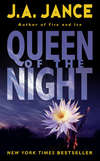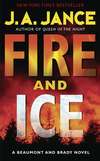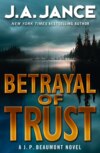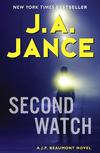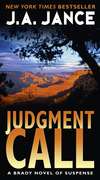Loe raamatut: «Queen of the Night»

Queen of the Night
J. A. Jance

Contents
Cover
Title Page
Prologue
Chapter 1
Chapter 2
Chapter 3
Chapter 4
Chapter 5
Chapter 6
Chapter 7
Chapter 8
Chapter 9
Chapter 10
Chapter 11
Chapter 12
Chapter 13
Chapter 14
Chapter 15
Here’s a sneak preview of J. A. Jance’s new novel
About the Author
By J. A. Jance
Copyright
About the Publisher
Prologue
THEY SAY IT happened long ago that a young woman of the Tohono O’odham, the Desert People, fell in love with a Yaqui warrior, a Hiakim, and went to live with him and his people, far to the South. Every evening, her mother, Old White- Haired Woman, would go outside by herself and listen. After a while her daughter’s spirit would speak to her from her new home far away. One day Old White-Haired Woman heard nothing, so she went to find her husband.
“Our daughter is ill,” Old White-Haired Woman told him. “I must go to her.”
“But the Hiakim live far from here,” he said, “and you are a bent old woman. How will you get there?”
“I will ask I’itoi, the Spirit of Goodness, to help me.”
Elder Brother heard the woman’s plea. He sent Coyote, Ban, to guide Old White-Haired Woman’s steps on her long journey, and he sent the Ali Chu Chum O’odham, the Little People—the animals and birds—to help her along the way. When she was thirsty, Ban led her to water. When she was hungry, the Birds, U’u Whig, brought her seeds and beans to eat.
After weeks of traveling, Old White-Haired Woman finally reached the land of the Hiakim. There she learned that her daughter was sick and dying.
“Please take my son home to our people,” Old White-Haired Woman’s daughter begged. “If you don’t, his father’s people will turn him into a warrior.”
You must understand, nawoj, my friend, that from the time the Tohono O’odham emerged from the center of the earth, they have always been a peace-loving people. So one night, when the Hiakim were busy feasting, Old White-Haired Woman loaded the baby into her burden basket and set off for the North. When the Yaqui learned she was gone, they sent a band of warriors after her to bring the baby back.
Old White-Haired Woman walked and walked. She was almost back to the land of the Desert People when the Yaqui warriors spotted her. I’itoi saw she was not going to complete her journey, so he called a flock of shashani, black birds, who flew into the eyes of the Yaqui and blinded them. While the warriors were busy fighting shashani, I’itoi took Old White-Haired Woman into a wash and hid her.
By then the old grandmother was very tired and lame from all her walking and carrying.
“You stay here,” Elder Brother told her. “I will carry the baby back to your people, but while you sit here resting, you will be changed. Because of your bravery, your feet will become roots. Your tired old body will turn into branches. Each year, for one night only, you will become the most beautiful plant on the earth, a flower the Milgahn, the whites, call the night-blooming cereus, the Queen of the Night.”
And it happened just that way. Old White-Haired Woman turned into a plant the Indians call ho’ok-wah’o, which means Witch’s Tongs. But on that one night in early summer when a beautiful scent fills the desert air, the Tohono O’odham know that they are breathing in kok’oi ’uw, Ghost Scent, and they remember a brave old woman who saved her grandson and brought him home.
Each year after that, on the night the flowers bloomed, the Tohono O’odham would gather around while Brought Back Child told the story of his brave grandmother, Old White-Haired Woman, and that, nawoj, my friend, is the same story I have just told you.
San Diego, California
Saturday, March 21, 1959, Midnight
58º Fahrenheit
Long after everyone else had left the beach and returned to the hotel, and long after the bonfire died down to coals, Ursula Brinker sat there in the sand and marveled over what had happened. What she had allowed to happen.
When June Lennox had invited Sully to come along to San Diego for spring break, she had known the moment she said yes that she was saying yes to more than just a fun trip from Tempe, Arizona, to California. The insistent tug had been there all along, for as long as Sully could remember. From the time she was in kindergarten, she had been interested in girls, not boys, and that hadn’t changed. Not later in grade school when the other girls started drooling over boys, and not later in high school, either.
But she had kept the secret. For one thing, she knew how much her parents would disapprove if Sully ever admitted to them or to anyone else what she had long suspected— that she was a lesbian. She didn’t go around advertising it or wearing mannish clothing. People said she was “cute,” and she was—cute and smart and talented. She didn’t know exactly what would happen to her if people figured out who she really was, but it probably wouldn’t be good. She did a good job of keeping up appearances, so no one guessed that the girl who had been valedictorian of her class and who had been voted most likely to succeed was actually queer “as a three-dollar bill.” That was what some of the boys said about people like that—people like her. And she was afraid that by talking about it, what she was feeling right now would be snatched away from her, like a mirage melting into the desert.
She had kept the secret until now. Until today. With June. And she was afraid, if she left the beach and went back to the hotel room with everyone else and spoke about it, if she gave that newfound happiness a name, it might disappear forever as well.
The beach was deserted. When she heard the sand- muffled footsteps behind her, she thought it might be June. But it wasn’t.
“Hello,” she said. “When did you get here?”
He didn’t answer that question. “What you did was wrong,” he said. “Did you think you could keep it a secret? Did you think I wouldn’t find out?”
“It just happened,” she said. “We didn’t mean to hurt you.”
“But you did,” he said. “More than you know.”
He fell on her then. Had anyone been walking past on the beach, they wouldn’t have paid much attention. Just another young couple carried away with necking; people who hadn’t gotten themselves a room, and probably should have.
But in the early hours of that morning, what was happening there by the dwindling fire wasn’t an act of love. It was something else altogether. When the rough embrace finally ended, the man stood up and walked away. He walked into the water and sluiced away the blood.
As for Sully Brinker? She did not walk away. The brainy cheerleader, the girl who had it all—money, brains, and looks—the girl once voted most likely to succeed would not succeed at anything because she was lying dead in the sand—dead at age twenty-one—and her parents’ lives would never be the same.
Los Angeles, California
Saturday, October 28, 1978, 11:20 P.M.
63º Fahrenheit
As the quarrel escalated, four-year-old Danny Pardee cowered in his bed. He covered his head with his pillow and tried not to listen, but the pillow didn’t help. He could still hear the voices raging back and forth: his father’s voice and his mother’s. Turning on the TV set might have helped, but if his father came into the bedroom and found the set on when it wasn’t supposed to be, Danny knew what would happen. First the belt would come off and, after that, the beating.
Danny knew how much that belt hurt, so he lay there and willed himself not to listen. He tried to fill his head with the words to one of the songs he had learned at preschool: “You put your right foot in; you put your right foot out. You put your right foot in, and you shake it all about. You do the hokey-pokey and you turn yourself around. That’s what it’s all about.”
He was about to go on to the second verse when he heard something that sounded like a firecracker—or four firecrackers in a row, even though it wasn’t the Fourth of July.
Blam. Blam. Blam. Blam.
After that there was nothing. No other sound. Not his mother’s voice and not his father’s, either. An eerie silence settled over the house. First it filled Danny’s ears and then his heart.
Finally the bedroom door creaked open. Danny knew his father was standing in the doorway, staring down at him, so he kept both eyes shut—shut but not too tightly shut. That would give it away. He didn’t move. He barely breathed. At last, after the door finally clicked closed, he opened his eyes and let out his breath.
He listened to the silence, welcoming it. The room wasn’t completely dark. Streetlights in the parking lot made the room a hazy gray, and there was a sliver of light under the doorway. Soon that went away. Knowing that his father had probably left to go to a bar and drink some more, Danny was able to relax. As the tension left his body, he fell into a deep sleep, slumbering so peacefully that he never heard the sirens of the arriving cop cars or of the useless ambulance that arrived far too late. Danny had no idea that the gunshot victim, his mother, was dead long before the ambulance got there.
Much later, at least it seemed much later to him, someone—a stranger in a uniform—gently shook him awake. The cop wrapped the tangled sheet around Danny and lifted him from the bed.
“Come on, little guy,” he said huskily. “Let’s get you out of here.”
Thousand Oaks, California
Monday, June 1, 2009, 11:45 P.M.
60º Fahrenheit
It was late, well after eleven, as Jonathan sat in the study of his soon-to-be-former McMansion and stared at his so-called wall of honor. The plaques and citations he saw there—his Manager of the Year award, along with all the others that acknowledged his years of exemplary service, were relics from another time and place—from another life. They were the currency and language of some other existence, where the rules as he had once known them no longer applied.
What had happened on Wall Street had trickled down to Main Street. As a result, his banking career was over. His job was gone. His house would be gone soon, and so would his family. He wasn’t supposed to know about the boyfriend Esther had waiting in the wings, but he did. He also knew what she was really waiting for—the money from his 401(k). She wanted that, too, and she wanted it now.
Esther came in then—barged in, really—without knocking. The fact that he might want a little privacy was as foreign a concept as the paltry career trophies still hanging on his walls. She stood there staring at him, hands on her hips.
“You changed the password on the account,” she said accusingly.
“The account I changed the password on isn’t a joint account,” he told her mildly. “It’s mine.”
“We’re still married,” she pointed out. “What’s yours is mine.”
And, of course, that was the way it had always been. He worked. She stayed home and saw to it that they lived beyond their means, which had been considerable when he’d still had a good job. The problem was he no longer had that job, but she was still living the same way. As far as she was concerned, nothing had changed. For him everything had changed. Esther had gone right on spending money like it was water, but now the well had finally run dry. There was no job and no way to get a job. Banks didn’t like having bankers with overdue bills and credit scores in the basement.
“I signed the form when you asked me to so we could both get the money,” she said. “I want my fair share.”
He knew there was nothing about this that was fair. It was the same stunt his mother had pulled on his father, making him cough up money that she had never earned. Well, maybe the scenario wasn’t exactly the same. As far as he knew, his mother hadn’t screwed around on his father, but Jonathan had vowed it wouldn’t happen to him—would never happen to him. Yet here it was happening—and then some.
“It may be in an individual account, but that money is a joint asset,” Esther declared. “You don’t get to have it all.”
She was screaming at him now. He could hear her and so could anyone else in the neighborhood. He was glad they lived at the end of the cul-de-sac—with previously foreclosed houses on either side. It was a neighborhood where living beyond your means went with the territory.
“By the time my lawyer finishes wiping the floor with you, you’ll be lucky to be living in a homeless shelter,” she added. “As for seeing the kids? Forget about it. That’s not going to happen. I’ll see to it.”
With that, she spun around as if to leave. Then, changing her mind, she grabbed the closest thing she could reach, which turned out to be the wooden plaque with the bronze Manager of the Year faceplate, and heaved it at him. The sharp corner of the wood caught him full in the forehead—well, part of his very tall comb-over forehead—and it hurt like hell. It bled like hell.
As blood leaked into his eye and ran down his cheek, all the things he had stifled through the years came to a head. He had reached the end of his rope, the point beyond which he had nothing left to lose.
Opening the top drawer of his desk, he removed the gun—a gun he had purchased with every intention of turning it on himself. Then, rising to his feet, he hurried out of the room, intent on using it on someone else.
His whole body sizzled in a fit of unreasoning hatred. If that had been all there was to it, any defense attorney worthy of the name could have gotten him off on a plea of temporary insanity, because in that moment he was insane—legally insane. He knew nothing about the difference between right and wrong. All he knew was that he had taken all he could take. More than he could take.
The difficulty is that this was only the start of Jonathan Southard’s problems. Everything that happened after that was entirely premeditated.
Chapter 1
Tucson, Arizona
Saturday, June 6, 2009, 8:00 A.M.
76º Fahrenheit
PIMA COUNTY HOMICIDE detective Brian Fellows loved Saturdays, even hot summer Saturdays. Kath, Brian’s wife, usually worked Saturday shifts at her Border Patrol desk job, which meant Brian had the whole day to spend with his girls, six-year-old twins Annie and Amy. They usually started with breakfast, either sharing a plate-sized sticky sweet roll at Gus Balon’s on Twenty-second Street, or downing eye-watering plates of chorizo and eggs at Wag’s on Grant.
After that, they went home to clean house. Brian’s mother had been a much-divorced scatterbrain even before she became an invalid. Brian had learned from an early age that if he wanted a clean house, he’d be the one doing it. It hadn’t killed him, either. He’d turned into a self-sufficient kind of guy and, according to Kath, an excellent catch for a husband.
Brian wanted the same thing for his daughters—for them to be self-sufficient. It didn’t take long on Saturdays to whip their central-area bungalow into shape. In the process, while settling the occasional squabble, being a bit of a tough taskmaster, and hearing about what was going on with the girls, Brian made sure he was a real presence in his daughters’ lives—a real father.
That was something that had been missing in Brian’s childhood—at least as far as his biological father was concerned. His “sperm donor,” as Brian thought of the man who had been MIA in his life from before he was born. He wouldn’t have had any idea about what fathers were supposed to be or do if it hadn’t been for Brandon Walker, his mother’s first husband and the father of Tommy and Quentin, Brian’s older half brothers.
After Brian’s mother’s first divorce, Brandon Walker, then a Pima County homicide detective, had come to the house each weekend and dutifully collected his own sons to take them on noncustodial outings. One of Brian’s first memories was of being left alone on the front steps while Quentin and Tommy went racing off to jump in their father’s car to go somewhere fun—to a movie or the Pima County Fair, or maybe even the Tucson Rodeo—while Brian, bored and lonely, had to fend for himself.
Then one day a miracle happened. After Quentin and Tommy were already in the car, Brandon had gotten back out. He came up the walk and asked Brian if he would like to go along. Brian was beyond excited. Quentin and Tommy had been appalled and had done everything in their power to make Brian miserable, but they did that anyway—even before Brandon had taken pity on him.
From then on, that’s how it was. Whenever Brandon had taken his own boys somewhere, he had taken Brian as well. The man had become a superhero in Brian’s eyes. He had grown up wanting to be just like him, and it was due in no small measure to Brandon Walker’s early kindness that Brian Fellows was the man he was today—a doting father and an experienced cop. And it was why, on Saturday afternoons, after the house was clean, that he never failed to take his girls somewhere to do something fun—to the Randolph Park Zoo or the Arizona Sonora Desert Museum. Today, as hot as it was, they had already settled on going to a movie at Park Mall.
Brian was on call. Only if someone decided to kill someone tonight would he have to go in to work. Otherwise he would have had his special day with his girls— well, all but one of his girls. That was what made life worth living.
Tucson, Arizona
Saturday, June 6, 2009, 11:00 A.M.
90º Fahrenheit
Brandon Walker knew he was running away. He had the excuse of running to something, but he understood that he was really escaping from something else, something he didn’t want to face. He would face it eventually because he had to, but not yet. He wasn’t ready.
Not that going to see G. T. Farrell was light duty by any means. Stopping by to see someone who was on his way to hospice care wasn’t Brandon’s idea of fun. Sue, Geet’s wife, had called with the bad news. Her husband’s lung cancer had been held at bay for far longer than anyone had thought possible, but now it was back. And winning.
“He’s got a set of files that he had me bring out of storage,” Sue had said in her phone call. “He made me promise that I’d see to it that you got them—you and nobody else.”
Brandon didn’t have to ask which file because he already knew. Every homicide cop has a case like that, the one that haunts him and won’t let him go, the one where the bad guy got away with murder. For Geet Farrell that case had always been the 1959 murder of Ursula Brinker, a twenty-one-year-old coed who had died while on a spring-break trip to San Diego.
Geet had been a newbie ASU campus cop at the time of her death. Even though the crime had occurred in California, it had rocked the entire university community. Geet had been involved in interviewing Ursula’s friends and relations, including her grieving parents. The case had stayed with him, haunting him the whole time he’d worked as a homicide detective for the Pinal County Sheriff’s Department, and through his years of retirement as well. Now that Geet knew it was curtains for him, he wanted to hand Ursula’s unsolved case off to someone else and let his problem be Brandon’s problem.
Fair enough, Brandon thought. If I’m dealing with Geet Farrell’s difficulties, I won’t have to face up to my own.
Geet was a good five years older than Brandon. They had met for the first time as fellow cops decades earlier. In 1975, Brandon Walker had been working Homicide for the Pima County Sheriff’s Department, and G. T. Farrell had been his Homicide counterpart in neighboring Pinal. Between them they had helped bring down a serial killer named Andrew Philip Carlisle. Partially due to their efforts, Carlisle had been sentenced to life in prison. He had lived out his remaining years in the state prison in Florence, Arizona, where he had finally died.
Brandon Walker had also received a lifelong sentence as a result of that case, only his had been much different. One of Carlisle’s intended victims, the fiercely independent Diana Ladd, had gone against type and consented to become Brandon Walker’s wife. They had been married now for thirty-plus years.
It was hard for Brandon to imagine what his life would have been like if Andrew Carlisle had succeeded in murdering Diana. How would he have survived for all those years if he hadn’t been married to that amazing woman? How would he have existed without Diana and all the complications she had brought into his life, including her son, Davy, and their adopted Tohono O’odham daughter, Lani?
Much later, long after both detectives had been turned out to pasture by their respective law enforcement agencies, Geet by retiring and Brandon by losing a bid for re-election, Geet had been instrumental in the creation of an independent cold case investigative entity called TLC, The Last Chance, an organization founded and funded by Hedda Brinker, Ursula Brinker’s still grieving mother. In an act of seeming charity, Geet had seen to it that his old buddy, former Pima County sheriff Brandon Walker, be invited to sign on with TLC.
That ego-salving invitation, delivered in person by a smooth-talking attorney named Ralph Ames, had come at a time when, as Brandon liked to put it, he had been lower than a snake’s vest pocket. He had accepted Ames’s offer without a moment of hesitation. In the intervening years, Brandon had worked hand in hand with other retired law enforcement and forensic folks who volunteered their skills and expertise to make TLC live up to its case-closing promises. For Brandon, the ability to do that—to continue making a contribution even in retirement—had saved his sanity, if not his life.
All of which meant Brandon owed everything to Geet Farrell. That was why he was making this pilgrimage to Casa Grande late in the morning on what promised to be a scorcher of a Saturday in early June. Of course heat was relative. By July and early August, the hot days of June would seem downright cool in comparison.
Weather aside, Brandon understood that this was going to be a deathbed visit, but he didn’t mind. He hoped that by doing whatever he could to help out, he might be able to even the score with Geet Farrell just a little. After all, this was a debt of gratitude, one Brandon Walker was honor-bound to repay.
Tucson, Arizona
Saturday, June 6, 2009, 1:10 P.M.
94º Fahrenheit
Diana Ladd Walker sat in her backyard gazebo next to a bubbling fountain typing into her laptop. It was shady there, but it was still hot and dry. Soon she’d either have to go into the pool for a dip, or else she’d have to retreat to the air-conditioned comfort of the house.
“So how are things working out for you?” Andrew Carlisle asked.
Rendered speechless, Diana stared at the vision that had suddenly materialized over the top of her computer.
Shirtless and hatless, Carlisle sat in full early-afternoon sunlight with his scarred face and sightless eyes staring up into a blazing blue sky. If he hadn’t been blind already, staring at the sun would have made him so.
Examining every aspect of her unwelcome visitor, Diana might have been viewing a close-up shot of someone on Brandon’s new high-defflat-screen TV set. Every detail was astonishingly vivid—from the sparse strands of white hair that sprinkled his sunken chest to the grizzled unshaved beard that dotted his gaunt cheeks and the scarred and rippled skin of his forehead and nose.
I did that, Diana thought, gasping involuntarily at the sight of those horrifying scars. I’m responsible for doing that to a living, breathing human being, back when he was alive.
Which Andrew Carlisle was not. The man sitting across the table from Diana was most definitely not alive. She knew that for certain. He had been alive when he had come to her house years earlier, intent on rape and murder. Before it was over, he had left Diana with his own special trademark—a fierce bite mark that even now still scarred her breast. But Carlisle had underestimated her back then. He hadn’t expected Diana to fight back or to leave him permanently disfigured in the process. All of that had happened long ago—before he had gone to prison for the second time and before he died there. Back in those days there had been no swimming pool or fountain or gazebo in Diana’s walled backyard, and she most certainly hadn’t been working on a laptop.
“We are not having this conversation,” she said to him now.
“Come on, Diana,” he urged. “For old times’ sake. Let bygones be bygones. Tell me, how’s the writing going? What are you working on now?”
She was dealing with some backed-up business correspondence, but she wasn’t going to tell him that.
“What I’m working on is none of your business,” she responded.
“Of course it’s my business,” Carlisle insisted. “I’m always interested when one of my students goes on to achieve remarkable success in the publishing world.”
“I was not your student,” Diana told him flatly. “My first husband was your student, remember? I never was. Go away and leave me alone.”
“Give me a break, Diana. I’m still annoyed that Shadow of Death won a Pulitzer. You never would have won that award without me. I was the guy who came up with the idea, and the whole book was all about me. You should have given me more credit.”
“You didn’t deserve more credit,” she said. “You didn’t write it. I did.”
“Oh, well. No matter,” he said with a sigh. “After all, fame is fleeting. I thought you’d be glad to see me. Mitch may drop by a little later, too. And Gary. You’d like to see him again, too, wouldn’t you? Although, come to think of it, maybe not. That self-inflicted bullet left a hell of a hole in his head. Not so much in the front as in the back. Exit-wound damage and all that. I’m sure you know how those work.”
Living or dead, Diana had no desire to see her dead first husband, Garrison Walther Ladd III, nor did she want to see Mitch Johnson, the surrogate killer Carlisle had sent to attack her family in his stead when Carlisle himself could no longer pose a direct threat.
“Shut up,” she said.
Tires crunched on the gravel driveway. Damsel, Diana’s aging nine-year-old mutt, pricked her ears and raised her head at the sound. She had come to Diana and Brandon as a rollicking pound puppy some eight years earlier when her antics had earned her the title of Damn Dog. Now she was a well-behaved grizzled old dog with a nearly white muzzle and a game hip. She stood up and steadied herself for a moment. Then, with an arthritic limp, she hurried over to the side gate, barking in welcome.
“My daughter’s coming,” Diana said. “Go away.”
“Lani is coming here?” Carlisle sounded delighted. “The lovely Lani? Do tell. Wonderful. Maybe she’ll show me her scar.”
“What scar?”
“Oh, I forgot. You don’t know about that.”
“What scar?” Diana insisted.
“Ask her about it if you don’t believe me. I understand Mitch left her a little something to remember him by. Let’s just say it’s a token of my esteem.”
Lani had been sixteen when Mitch Johnson, Andrew Carlisle’s minion, had kidnapped Diana’s daughter.
“What?” Diana asked. “What did he do to her?”
“Why don’t you ask her yourself?” Determinedly, Diana turned her attention back to her laptop. She thought Carlisle would disappear when she did that, but he didn’t. He stayed right there with his face turned in her direction. Since he was blind now, he could no longer stare at her, but the same expression was on his face—the same disparaging smirk he had aimed at her once before, long ago in a courthouse hallway.
“You’re not welcome here,” she told him. “Go away.”
Highway 86, West of Tucson, Arizona
Saturday, June 6, 2009, 12:00 P.M.
93º Fahrenheit
Eight-year-old Gabriel Ortiz sat up straight in Dr. Lani Walker’s car and seemed to be studying the scenery as it whizzed by outside the windows of the speeding Passat. This was the first time Lani could remember his being tall enough to ride in the front seat. He evidently liked it.
“Where are we going again, Lani Dahd?” he asked.
Dahd was Tohono O’odham for godmother, and that was Lani Walker’s role in Gabe’s young life. She had been there to deliver him in the back of her adoptive mother’s prized Invicta convertible eight years earlier, and she had been there for him ever since, spending as much time with him as possible whenever she was home on breaks—first from medical school and later from her hospital residency in Denver.
She was doing her best to be Gabe’s mentor and to give him the benefit of everything she had learned from the mentors in her life, her own godparents, namely Gabe’s great-aunt, Rita Antone, and his grandfather, Fat Crack Ortiz. Of course, those people in turn had learned what they knew from the old people in their own lives, from a blind medicine man called Looks at Nothing, and from Rita’s grand-mother, Oks Amachuda, Understanding Woman.
“We’re going to stop by the house to pick up my mother,” Lani answered. “Then we’re going to a place called Tohono Chul.”
Gabe frowned. “Desert corner?” he asked.
Lani smiled at his correct translation. She was glad he was learning some of his native language, and not just from her, either.
“Not a corner, really,” she corrected. “It’s a botanical garden, devoted to preserving the desert’s native plants.”
“You mean like a zoo but for plants?” Gabe asked.
Lani nodded. “Exactly. There’s a party there tonight. My mother and I are invited, and I thought you should go, too. After all, you’re eight—that’s old enough.”
